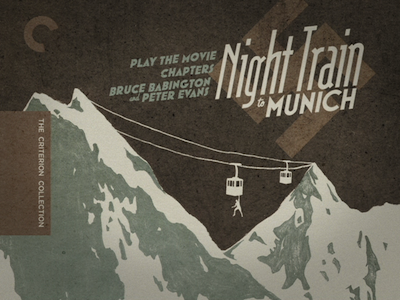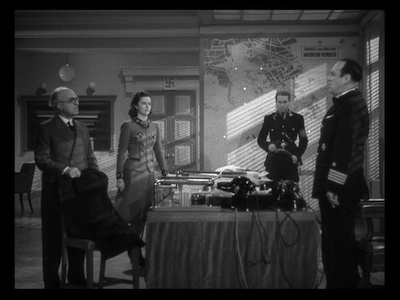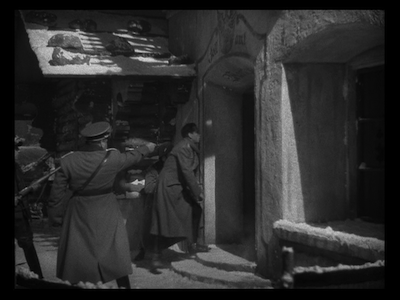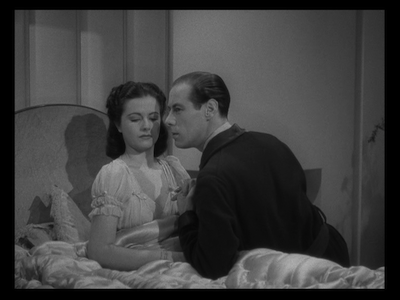
Rex Harrison is a glorious bastard. In Carol Reed's 1940 war movie Night Train to Munich, the all-too-British actor dons a Nazi uniform and waltzes through enemy lines with nothing but a false letter of introduction and an uncommon sense of bravado. Lucky for him, unlike Michael Fassbender in Quentin Tarantino's Inglourious Basterds [review], he doesn't have to worry about getting the German accent right. Everyone here speaks the Queen's English regardless of national origin.
Which was kind of confusing at the outset, I must admit. Though the heroine of our tale, Anna Bomasch (Margaret Lockwood), and her father (James Harcourt) are first seen in Prague, I didn't get right away that they were Czech. And you really can't fault the Nazi officer later in the picture who doesn't realize that Charters and Caldicott (Basil Radford and Naunton Wayne) are proper British gentleman. Everyone in Carol Reed's version of Europe is!

Night Train to Munich is a quaint propaganda thriller made while England's involvement in the war was still fresh. Writers Sidney Gilliat and Frank Launder, working from a story by Gordon Wellesley, set their script a year prior to the production, on the eve of France and the UK getting into the combat. It portrays an England that was ready for anything, their eye firmly and suspiciously trained on their aggressive neighbors to the west. The intention of the film was similar to that of Powell & Pressburger's The 49th Parallel [review]: to bolster and inspire through popular entertainment. Hollywood made similar movies throughout the war, though with a far toothier American demeanor--most of our heroes followed an arc that took them from cynical loner to righteous patriot in 90 minutes. The British film industry, on the other hand, gave us upright citizens more than eager to engage in what was right. As a result, a lot of their wartime films, including Night Train to Munich, are far more obvious in their mission.

Though, to be fair, Night Train manages to scrounge some pretty good nail-biting scenarios out of all these good intentions. The personnel involved knew their way around a suspense picture. Gilliat and Launder previously wrote another mystery set on a train, Hitchcock's early masterpiece The Lady Vanishes [review], a film that also starred Lockwood and introduced us to the droll supporting players Charters and Caldicott, the sort of fellows who apparently only vacation in trouble spots. (Tip to time travelers: if they are ever on your train, get off!) And, of course, Night Train's director Carol Reed would famously master the post-War thriller with films like The Third Man [review] and the less-known but equally intense Odd Man Out

Dr. Axel Bomasch is a Czech scientist developing a particularly strong new alloy that will be perfect for armored vehicles. When the war comes to Prague, he and his associates high tail it for England. The only hitch is that his daughter, Anna, is arrested at their house just as she is heading for the getaway plane. She is sent to a prison camp, where she meets the stalwart schoolteacher Karl Marsen (Paul Henreid, later to play the freedom fighter Victor Laszlo in Casablanca

I like that the love triangle in Night Train to Munich continues even after Karl is revealed to be a Ratzi. I like even more how it's done. How very British that so much of it is unspoken, and Karl's feelings in particular are never expressed. He is made a cuckold before he ever gets the chance to make a move, the fate of a man who chose his job over the girl. When he nabs the Bomasches and takes them back to the Reich, Gus switches places with him by going undercover as a Nazi officer who claims to have sway over Anna because they once had an affair. When he is given permission to spend the night romancing her in her (scandal!) hotel room, Karl is positively seething with unspoken anger. Not only is this cocky rival coming in and doing a job he can't (convincing the girl to convince her father to give up his secrets), but now there is a love affair, too? Little does he know that it's a pretend one, but then, Rex Harrison is such a wily cassanova, that's actually how he works his mojo. If you make the lady pretend you're irresistible often enough, she'll realize you really are!

Once these wheels are in motion, the group eventually ends up on the titular train, and that's where they also run into the comedy duo of Charters and Caldicott, followed by the eventual chase through Munich, including the scenes on the sky trams depicted on the cover of the DVD (the awesome artwork smartly modeled after old travel posters). The shootout in the mountains is a marvelous action sequence, and Reed and cameramen Otto Kanturek do a tremendous job of re-creating the majesty of the Swiss Alps via models and matte paintings (also note the cool model work when Anna and Karl escape the concentration camp). By this point, Night Train to Munich has transcended its propaganda origins and turned into a cracking movie.
If I have one complaint about Night Train, it's probably that Margaret Lockwood is an undervalued member of the team. Both Harrison and Henreid are so good in their roles and have such meaty material to wrestle with, it sometimes feels like the girl they are fighting over is lost in the process. Gus does try to make Anna an active part of the scheme, but the writers don't go far enough with it. Margaret Lockwood is charming and very pretty and so more than capable, and Anna has a plenty of motivation for being a killer lady spy, but the boys in charge are far too willing to let their fellows take control. Particularly once Radford and Wayne join the escape party, their banter practically shoves any conversation between Anna and Gus off the screen.

Still, that's a minor problem in what is otherwise some damn fine light entertainment. Thought not as deep as Reed's later movies--even if we do get a few scenes where his use of shadows suggest the noir to come--it's actually a lot more fun. His light touch with the action and the humor more than makes up for any heavy hand in the underlying message, and all told, Night Train to Munich makes for an enjoyable return trip to the matinees of yesterday.


1 comment:
Very enjoyable movie, but I wondered just how many bullets were in the revolvers. I counted at least 10. :)
Post a Comment